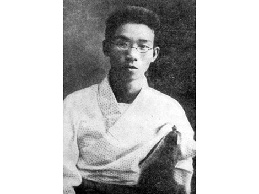Yu Dafu - Modern Chinese Short Story Writer and Poet
Yu Dafu (郁达夫) (December 7, 1896—September 17, 1945). Born in Fuyang, Hangzhou, Zhejiang, was a modern Chinese short story writer and poet.

Early years
Yu Dafu's father died at age three, leaving the family poverty-stricken and destitute. He received a number of scholarships through the Chinese government and went on to receive a traditional Chinese education in Hangzhou. Chronologically he studied in Jiangxing-Fu Middle School (before he came to Hangzhou), Hangzhou-Fu Middle School, Yuying Academy (育英学堂, former of the Zhejiang University).
In 1912, he entered Hangchow University (later its major part merged into Zhejiang University) preparatory through examination. He was there only for a sort period before he was expelled for participation in a student strike.
He then moved to Japan, where he studied economics at the Tokyo Imperial University between 1913 and 1922, where he met other Chinese intellectuals (namely, Guo Moruo, Zhang Ziping and Tian Han). Together, in 1921 they founded the Chuangzao she ("Creation Society"), which promoted vernacular and modern literature. One of his earlier works Chenlun ("sinking"), also his most famous, published in Japan in 1921. The work had gained immense popularity in China, shocking the world of Chinese literature with its frank dealing with sex, as well as grievances directed at the incompetence of Chinese government at the time.
In 1922, he returned to China as a literary celebrity and worked as the editor of Creation Quarterly, editing journals and writing short stories. In 1923, after an attack of tuberculosis, Yu Dafu directed his attention to the welfare of the masses.
In 1927, he worked as an editor of the Hongshui literary magazine. He later came in conflict with the Communist Party of China and fled back to Japan.
In the Second Sino-Japanese War
After the start of the Second Sino-Japanese war, he returned to China and worked as a writer of anti-Japanese propaganda in Hangzhou, and later in Zhejiang. From 1938 to 1942, he worked as a literary editor for the newspaper Sin Chew Jit Poh in Singapore.
In 1942 when the Imperial Japanese Army invaded Singapore, he was forced to flee to Sumatra. Known under a different identity, he settled there among other overseas Chinese and began a brewery business with the help of the locals. Later he was forced to help the Japanese military police as an interpreter when it was discovered that he was one of the few "locals" in the area who could speak Japanese.
In 1945, he was arrested by the Kempeitai when his true identity was finally discovered. It is believed that he was executed by the Japanese shortly after the surrender of Japan.
Source: cultural-china.com
Editor: Feng Hui
|

